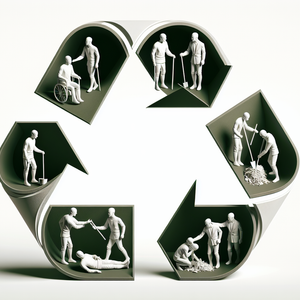From Desert to Oasis: Innovations in Phoenix Water Purification

One of the cornerstones of Phoenix’s water purification efforts is reverse osmosis (RO). This advanced technology involves forcing water through semi-permeable membranes that effectively remove contaminants such as salts, heavy metals, and bacteria. The City of Phoenix Water Services Department has implemented RO systems in their treatment plants, resulting in a significant improvement in drinking water quality. For instance, the 91st Avenue Wastewater Treatment Plant utilizes RO to ensure that the water released back into the environment meets stringent safety standards, thereby helping to protect local ecosystems.
Ultraviolet (UV) Disinfection
In addition to RO, the city has adopted ultraviolet (UV) disinfection methods in its water treatment facilities. By exposing water to UV light, harmful pathogens are killed or rendered inactive, providing an extra layer of safety in the purification process. The combination of RO and UV treatment not only ensures the removal of physical contaminants but also protects against microbial threats, thereby enhancing public health.
Water Reclamation and Reuse
To tackle water scarcity, Phoenix has integrated water reclamation systems into its overall water management strategy. This involves treating wastewater to a high standard, enabling it to be reused for various purposes, including irrigation, industrial processes, and groundwater replenishment. The 91st Avenue Wastewater Treatment Plant exemplifies this approach, processing over 100 million gallons of wastewater daily. This reclaimed water is then used to irrigate parks and golf courses, effectively reducing the demand for fresh water.
Aquifer Recharge Projects
Recognizing the importance of groundwater resources, Phoenix has initiated innovative aquifer recharge projects that utilize reclaimed water. These projects direct treated water into underground aquifers, aiding in the conservation of water and enhancing the natural replenishment of these vital resources. This proactive strategy helps combat the depletion of groundwater supplies, ensuring a sustainable water future for the city.
Innovative Research and Development
Local universities, particularly Arizona State University (ASU), are playing a critical role in advancing water purification technologies. ASU’s Global Institute of Sustainability collaborates with local utilities to explore new filtration techniques and smart water management systems. By fostering partnerships between academia and industry, Phoenix is at the forefront of developing innovative solutions that address the city’s water challenges.
Pilot Projects
Several pilot projects have emerged in Phoenix, focusing on cutting-edge technologies such as nanotechnology and membrane filtration. These initiatives aim to optimize water treatment operations, reduce energy consumption, and enhance the overall efficiency of purification processes. By testing these emerging technologies, the city can identify best practices and scale successful methods for broader implementation.
Community Engagement and Education
As technological advancements reshape the water landscape, local water companies prioritize community engagement and education. Public awareness campaigns inform residents about the significance of water conservation, reducing waste, and the benefits of reclaimed water. These initiatives emphasize that every individual has a role in ensuring the sustainability of water resources.
Community Workshops
Workshops and outreach programs provide residents with hands-on experiences, teaching them about water conservation practices and the innovative technologies involved in their local water supply. By fostering a sense of ownership and responsibility among residents, these programs aim to cultivate a culture of sustainability within the community.
The transformation of Phoenix from a desert into an oasis is a testament to the innovative spirit and commitment of local water companies in addressing the challenges of water scarcity. Through advanced treatment technologies like reverse osmosis and UV disinfection, robust water reclamation efforts, collaborative research initiatives, and proactive community engagement, Phoenix is setting a standard for sustainable water management. As the city continues to adapt to changing environmental conditions, these innovations are not merely securing a reliable water supply for today but are also paving the way for a sustainable and resilient future. The journey from desert to oasis is ongoing, but with each technological advancement, Phoenix moves closer to ensuring that its residents have access to safe, clean drinking water for generations to come.
Water Treatment Plant Operator
City of Phoenix Water Services Department, private water utilities, environmental consulting firms
Core Responsibilities
Operate and monitor water treatment processes, including reverse osmosis and UV disinfection systems.
Conduct regular tests on water quality to ensure compliance with federal and state regulations.
Maintain equipment, troubleshoot issues, and implement corrective actions as needed.
Required Skills
Knowledge of water treatment processes and equipment operation.
Strong analytical skills for interpreting water quality data.
Ability to work in a team and communicate effectively with colleagues and management.
Environmental Scientist (Water Quality Specialist)
Environmental protection agencies, research institutions, consulting firms specializing in water resources
Core Responsibilities
Conduct research and field studies on water quality, assessing the impact of pollutants and treatment methods.
Collaborate with local universities to develop innovative water purification technologies.
Prepare reports and presentations on findings and recommendations for water management strategies.
Required Skills
Proficiency in laboratory techniques for water quality analysis.
Strong understanding of environmental regulations and policies.
Excellent written and verbal communication skills for stakeholder engagement.
Water Resource Manager
Municipal water departments, state water resource agencies, nonprofit organizations focused on environmental conservation
Core Responsibilities
Develop and implement strategies for sustainable water supply and reclamation projects.
Manage aquifer recharge initiatives and oversee water conservation programs.
Coordinate with government agencies and community organizations to promote water sustainability.
Required Skills
Strong project management skills and experience in water resource planning.
Ability to analyze data and make informed decisions regarding water usage and policies.
Effective communication and negotiation skills to collaborate with various stakeholders.
Research Engineer (Water Purification Technologies)
Universities, research institutions, companies specializing in water treatment solutions
Core Responsibilities
Design and conduct experiments to test new water purification technologies, including membrane filtration and nanotechnology.
Analyze performance data to optimize existing water treatment processes and reduce energy consumption.
Collaborate with cross-disciplinary teams and present research findings to industry partners.
Required Skills
Background in environmental engineering or a related field.
Familiarity with advanced water treatment technologies and laboratory equipment.
Strong problem-solving skills and the ability to work on innovative projects.
Community Outreach Coordinator (Water Conservation)
Water utility companies, nonprofit organizations focused on environmental education, government agencies promoting water conservation initiatives
Core Responsibilities
Develop and implement public awareness campaigns about water conservation and the benefits of reclaimed water.
Organize community workshops and educational programs to engage residents in sustainable practices.
Collaborate with local organizations to promote initiatives aimed at reducing water waste.
Required Skills
Strong interpersonal and communication skills to effectively engage with the community.
Experience in program development and evaluation.
Knowledge of environmental issues related to water sustainability.


